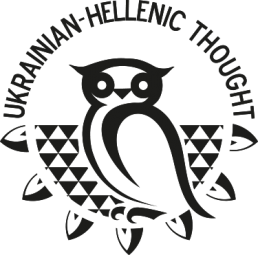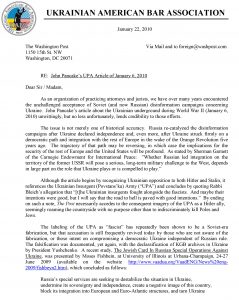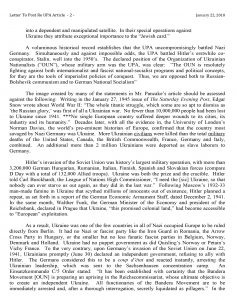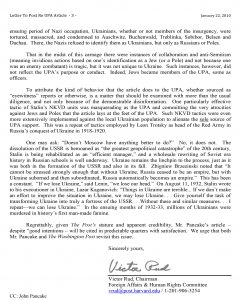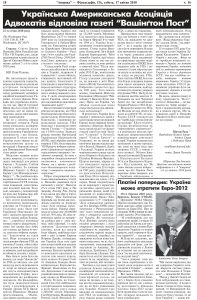Η Ουκρανία στον Β’ Παγκόσμιο πόλεμο/Україна в Другій світовій війні
Όποιος πραγματικά ενδιαφέρεται για το θέμα, με λίγη προσπάθεια θα μπορούσε πραγματικά να ανακαλύψει πολλές πληροφορίες θαμμένες κάτω από τεράστιων διαστάσεων προπαγανδιστικά βέλη εναντίον των ανθρώπων, που μοναδικό τους “έγκλημα” αποτελούσε ο αγώνας για την Ελευθερία της Πατρίδας τους και εναντίωσή τους στο φασιστικό χιτλερικό και σοβιετικό καθεστώς.
Υποχρέωση όλων των μορφωμένων ανθρώπων είναι η αποκατάσταση της αλήθειας και καταδίκη για καθεστώς που εδώ και δεκαετίες διαστρεβλώνει της πληροφορίες και παραπλανεί την κοινή γνώμη.
Moscow signs the Treaty of Rapallo, facilitating the rearmament of Germany after WWI; joint ventures WWII with Hitler via the Molotov/Ribbentrop Pact; pleads victimization under Operation Barbarossa, together with 20 million “Russian” deaths; condemns the target for Hitler’s war in Europe (Ukraine); and the target becomes the culprit. The Soviet Union then becomes a principal at the UN (borne of the very volcano that Moscow lit), and Russia (the unapologetic legatee) today both applauds the Molotov/Ribbentrop Pact, and vaporizes the UN’s founding precepts by invading Hitler’s target.
Ένα άρθρο δημοσιεύεται στη The Washington Post το 2010
washingtonpost.com <http://www.washingtonpost.com>
*In Ukraine, movement to honor members of WWII underground sets off debate*
By John Pancake
Special to The Washington Post
Wednesday, January 6, 2010; A07
LVIV, UKRAINE — In World War II, members of the Ukrainian underground
fought to make their vision of an independent nation real. They battled
Hitler and Stalin. Ultimately they lost, and the Soviets took control of
most of Eastern Europe after the war.
The Ukrainians finally achieved independence when the Soviet Union
collapsed in 1991. Now many in this fledgling nation would like to
formally recognize those earlier nationalists — the “brave defenders of
the Motherland,” as President Viktor Yushchenko has called them. Newly
introduced legislation would honor members of the underground and
provide them with benefits accorded to war veterans.
But the movement to pay tribute to the insurgent fighters has set off a
national debate about exactly what happened more than six decades ago.
Many say the underground collaborated with the Nazis, killed thousands
of Jews and perpetrated a campaign of ethnic cleansing against Poles.
The legacy of the underground flows through Ukrainian culture today. Its
best-known banner — a red-and-black flag — is seen at the rallies of
nationalist politicians. In this western Ukrainian city, where the
insurgency was active, members of the underground are buried in
elaborate marble tombs in a historic cemetery. Street vendors sell
memorabilia commemorating the resistance. There is even an
underground-themed restaurant outfitted as a bunker. In one corner,
diners can do target practice using a picture of Stalin.
While those involved in the debate over the underground are somewhat
polarized, they agree on one thing: It’s complicated.
To begin with, the underground was made up of many factions, subfactions
and rivals. In hindsight, some look better than others. Meanwhile, for
the majority of Ukrainian families, the experience of “the Great
Patriotic War” was fighting with the Red Army to defend the homeland.
Some descendants of Red Army soldiers view members of the underground as
traitors.
The effort to recognize the insurgents also is taking place against the
backdrop of centuries of persecution of Jews in Ukraine, where pogroms
were common.
The Cossack chieftain Bogdan Khmelnytsky, whose statue stands in the
Ukrainian capital, fought for independence during the 17th century. But
he also presided over the killings of tens of thousands of Jews, said
Rabbi Alexander Dukhovny, head of the Religious Union for Progressive
Jewish Congregations of Ukraine. “Was he a hero or an anti-hero? Even
after 350 years, it is difficult to know,” Dukhovny said.
Considerable research on the underground is underway in Ukraine and
Canada, a center of the Ukrainian diaspora.
One of the key figures involved in the research is Peter J. Potichnyj.
Born in a Ukrainian family in a village in what was then eastern Poland,
Potichnyj experienced the horrors of the war firsthand. Soviet secret
police executed his father. Poles massacred most of the people in his
village.
In 1945, at age 14, he joined the Ukrainian Insurgent Army, or UPA, and
fought against the Soviets until 1947. He eventually became a historian
at McMaster University in Hamilton, Ontario, and helped edit 77 volumes
about the Ukrainian underground.
Potichnyj, 79, said that although the underground may have had brief
strategic alliances with the Germans, it was mostly fighting the
Soviets. He said much of the anti-underground talk these days is
orchestrated from Russia
<http://www.washingtonpost.com/wp-srv/world/countries/russia.html?nav=el>.
“You know the Russians don’t want to admit there were people fighting
them — not because they were cooperating with the Germans but because
they were fighting for their own culture and the liberation of their own
countries,” he said.
As for the killings of Jews and Poles, Potichnyj argues that no matter
where guerrillas fight for liberation, it’s a messy affair. The Poles
provoked the Ukrainians, he said.
“With respect to Jews,” he said, “obviously, in the situation there must
have taken place some killing of the Jews, although in 1943, when the
UPA was quite strong, there were hardly any Jews left because the
Germans had, unfortunately, killed them all off. But there were some
remnants, and the remnants were either working with the Ukrainian
underground or they were working with the Soviets.” Those allied with
the Red partisans were obviously enemies of the underground, he said.
Potichnyj said the underground made a terrible mistake in not condemning
the Germans’ efforts to exterminate the Jews. But he strongly denies
that there is any document showing that the underground ordered the
“systematic” killing of Jews.
John-Paul Himka, a historian at the University of Alberta, believes
there was a systematic killing of Jews in some Ukrainian areas. Himka
has written extensively on the Holocaust and Ukrainian history. He said
he has read hundreds of accounts, composed in different places and at
different times, of Jews who survived; many mention killings by the
Ukrainian militia.
Of the plan to honor UPA fighters, he says: “This is really a problem
area because they killed so many people, civilians.” In addition to
Jews, he said, they killed 60,000 to 100,000 Poles, as well as political
opponents, Orthodox clergymen, teachers of Russian and many prisoners of
war from eastern Ukraine. He estimates that UPA fighters killed several
thousand Jews, “but perhaps the number was much higher.”
“Although what UPA did to the Jews may not have been, in the larger
scheme of things, a major contribution to the Holocaust, it remains a
large and inexpugnable stain on the record of the Ukrainian national
insurgency,” he said.
Olexiy Haran, a professor of comparative politics at the University of
Kyiv-Mohyla Academy, said Russian “propaganda” distorted the extent of
the atrocities. The Ukrainian insurgents were fighting for independence,
he insists.
“I believe that these people deserve to be veterans, maybe with the
exception of those who committed crimes,” he said. “This was guerrilla
warfare, and it’s difficult to imagine guerrillas without atrocities.”
Many academics say the debate over the underground is part of a larger
tug of war over Ukraine’s national identity. Russia ruled most of what
is now Ukraine for more than three centuries. But relations between the
countries have been testy, and since Yushchenko’s election in late 2004,
Ukraine has distanced itself from Russia while moving toward the West.
Yaakov Bleich, whose title is chief rabbi of Ukraine, said of
Yushchenko’s effort to legitimize the insurgents: “His goals are noble;
the means stink.”
“What I mean is that we all understand that Yushchenko is trying to
build up national pride, and we all understand that that is needed,”
Bleich said. “After 350 years that the Ukrainian people were subjugated,
they have to rebuild national pride.
“But should we take things that are controversial — heroes that are
still of questionable repute — and use them to do that?” he said. “At
this point you have people out there living today [who suffered], and
the image is one that would hurt people. The Ukrainian insurgents fought
alongside the fascists. And maybe their intentions were good, but I will
say that the road to hell is paved with good intentions.”
*– Special to The Washington Post*
View all comments
<http://www.washingtonpost.com/wp-dyn/content/article/2010/01/05/AR2010010503610_Comments.html>
that have been posted about this article.
© 2010 The Washington Post Company
Και η απάντηση της Ένωσης των Ουκρανών Δικηγόρων της Αμερικής
